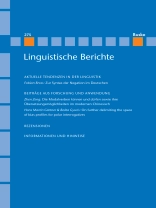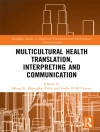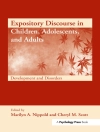Aktuelle Tendenzen in der Linguistik
– Fabian Bross: Zur Syntax der Negation im Deutschen
Abstract: The goal of the present article is a syntactic description of different types of negation in German. To be more precise, this article deals with sentential negation, constituent negation, and two types of contrastive negation. First, several tests are introduced to differentiate between sentential, constituent, and contrastive negation. Then, the different types of negation will be analyzed. While it is generally assumed in the literature that sentential negation in German is located directly above the VP, this article argues that there are reasons to believe that sentential negation is located in a higher position in-between tense and the VP. Additionally, it will be proposed that constituent negation is not a type of negation on its own right, but a special instance of sentential negation taking scope inside of a propositional expression which is embedded in a clause. Concerning contrastive negation, data will be presented suggesting that it comes in two flavors: contrastive constituent negation and contrastive sentential negation. It is argued that with contrastive constituent negation the whole negated constituent is moved into a position above tense, while with contrastive sentential negation there is no movement of a constituent, but a structurally high position for this kind of negation taking wide scope.
Beiträge aus Forschung und Anwendung
– Zhen Zeng: Die Modalverben können und dürfen sowie ihre Übersetzungsmöglichkeiten im modernen Chinesisch
Abstract: This article focuses on the modal verbs können and dürfen and their translational equivalents in modern Chinese. In the theoretical part, the modal verbs können and dürfen are compared to the Chinese equivalents néng/nénggòu, huì and kĕyĭ. This section shows the similarities and differences between können and dürfen and their Chinese equivalents. The following empirical investigations are intended to find out other Chinese translation options for können and dürfen as well as other German translation options for néng/nénggòu, huì and kĕyĭ. Two novels from German and modern Chinese serve as analysis data basis, so that translations from German into Chinese and from Chinese into German are the main focus of the study. The results obtained through the analysis can be used by Chinese translators with German as their first language to translate können and dürfen. In addition, German learners of Chinese can familiarize themselves with the modality types and the use of können and dürfen.
– Hans-Martin Gärtner & Beáta Gyuris: On further delimiting the space of bias profiles for polar interrogatives
Abstract: In Gärtner & Gyuris (2017) we defined the ‘bias profileˮ of an individual polar interrogative clause type as a non-empty choice from the power sets of evidential bias options and epistemic bias options for each of its expressive instantiations as positive polar question (PPQ), and negative polar questions with inside (IN-NPQ) and outside negation (ON-NPQ) in the sense of Ladd (1981). By simple arithmetic we predicted the existence of (7×7)^3 = 117649 such bias profiles.
We then explored the ‘spaceˮ of bias profiles and demonstrated a numerical reduction to just (4×2)^3 = 512 permissible types. This was based on differential choices from the sets of evidential and epistemic biases, formulated in terms of the principle of Static Complementarity (together with the principle of Convexity). In the current brief note, we will show how to considerably cut down options further by in addition imposing a bi-uniqueness constraint on the evidential bias of IN-NPQs.
Over de auteur
Nina-Kristin Meister (geborene Pendzich) hat an der Georg-August-Universität Göttingen Deutsche Philologie und Geschichte studiert und in Germanistischer Linguistik zum Thema »Lexikalische nichtmanuelle Markierungen in der Deutschen Gebärdensprache (DGS)« promoviert. Seit 2017 ist sie Leiterin des Experimentellen Gebärdensprachlabors am Seminar für Deutsche Philologie der Georg-August-Universität Göttingen und unterrichtet Germanistische Linguistik mit Schwerpunkt in der DGS. Ebenfalls seit 2017 ist sie in der Redaktion der Fachzeitschrift »Linguistische Berichte« tätig.












